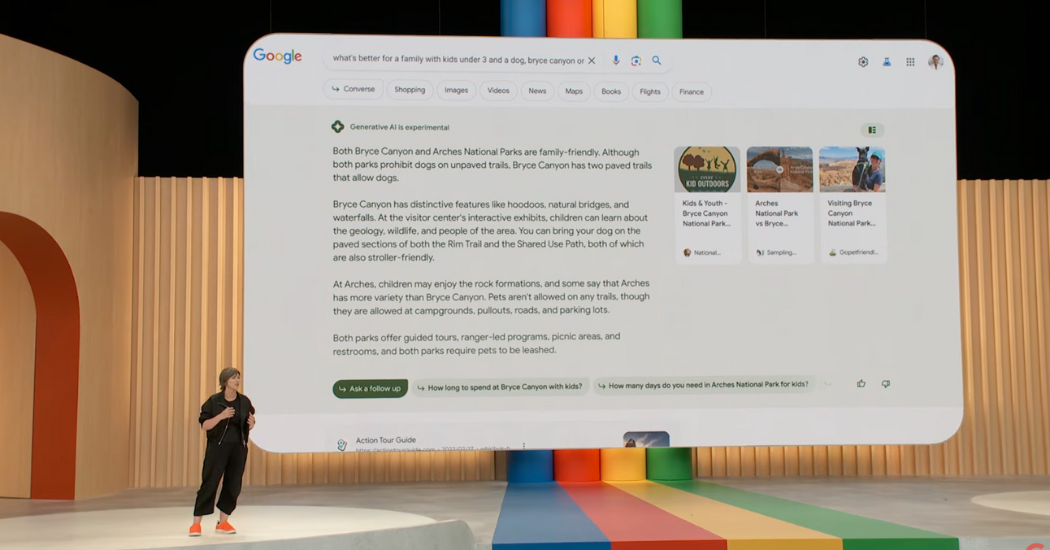Adapting to AI: Searching in an Evolving Environment

As search evolves with the introduction of AI-powered user functionalities, so will the approach to advertising. For over 20 years, how humans leverage search engines has changed drastically. In response, search engines have innovated how they deliver results with updates and new features to campaign types, ad formats and more. However, the adaptation to AI in paid search has been slower than expected despite the demand for more personalization. Due to the exponential growth in computing, we are now at a point of inflection.
You’ve heard the buzz about Microsoft’s ChatGPT, Google’s introduction of an AI-powered Search Engine Results Page (SERP) platform Bard, and maybe even whispers about Google’s Magi, a new search engine project in development. The common thread through these conversations sheds light on AI and machine-learning coming to the forefront of the user experience. Most of us are used to leveraging these tools behind the scenes of our works mastery via bid strategies, scripts, custom audiences, and more. Search marketers have been conditioned to educate clients on how machine-learning is enhancing performance but have yet to experience the true impact an AI-powered, more visual SERP will have.
With the expedited adoption of these experiences across Google and Microsoft, many questions have arised. When will target audiences see ads? In what format? Will there be fewer opportunities to advertise? Will there be higher costs and more competition? How are these companies maintaining and growing monetization? How can we improve our current use cases for AI with the uncharted territory of the visual, natural language SERP? While all these questions are valid and profound, search marketers remain skeptical of the unknown.
There’s one thing we know for certain; paid search will remain relevant, but our approach and strategies must adjust to reach our targets in the “new era” of SERPs. Change is not to be feared as successful pay-per-click (PPC) practices are built on pillars. A world where AI takes over all aspects ceases to exist so long as industry leaders and people managers continue to do the following:
- Carve out the new role human touch will play
- Understand how these tools and technology can identify opportunities faster and cut down on the “less shiny” tasks within PPC
- Focus on cultivating best practices that leverage AI and machine learning
Is AI the New Copywriter?
Personally, I’ve noticed the increase in LinkedIn thought starters highlighting AI’s threat to search marketers’ roles. Truly an arguable paradigm considering AI has been an advantage for us to leverage during some more of our daunting tasks such as copy writing. However, what role do humans play in automation?
Creativity: the output is only as strong as the input, and creativity is the hardest advantage for a competitor to copy. If marketers are clear and descriptive, AI-powered solutions will generate more natural language capturing the attention of the target audience more quickly. Attention is the most valuable currency of the future. However, both creativity and attention are deeply rooted in the talent your team holds and simply enhanced by AI, not replaced.
All the Chat About ChatGPT
Early adoption of ChatGPT is helping marketers overcome creative roadblocks, successfully increase efficiency in daily workflow, or in a more casual setting, develop healthy meal plans and resumes. Personally, Power Automate’s ability to decode emails, create calendar invites, or even generate to-do lists is quite impressive. The main theme of it all seems to orbit around the need for efficiency in our industry as it evolves. Whether the use case is practical or imaginative—(cue the Mean Girls memes)—“the limit does not exist” with ChatGPT.
There is no doubt that the ChatGPT platform and outputs are more personable and natural. The dynamic experience lends itself well to the everyday user. However, marketers’ initial reaction to the release was met with fear of inundating users with false information. Just like human relationships, trust needs to be developed. We’ve lived in a world of optimizing for ads and rewarding strong, accurate content. If results become monetized, does that not defeat the purpose of AI and will it hinder further adoption in advertising strategies? We may be looking at a new search environment rewarding engagement over answers.
Adapting to AI in Google Search
Speaking to Google has traditionally been keyword based. Pivoting to natural language search is inevitable to keep up with computing. Google will admit to being slow to adopt a more immersive AI-powered SERP for users, but after discussions at the 2023 I/O event in May, change is imminent. Search marketers (though skeptical) will have to pivot and refine best practices.
Google announced a more “visual, snackable, personal, and human” layout to their SERP tailored more to younger searchers. Their new experimental Google Search Generative Experience, or SGE, will not allow advertisers to opt out of showing ads or track their ads. We are being asked to put blind faith in Google’s new initiatives, such as Performance Max, all for the sake of a more human-esque interaction with computing. Will it become too complicated for the less tech-savvy individuals?
Like anything else, to make progress we must be comfortable with being uncomfortable. Dating myself, but these recent changes bring me back to when text ads became expanded or when new match types were first introduced. Now, we as search marketers must carve a new path without “ten blue links” and a change like such can be met with fear for those responsible for site traffic or content.
A company such as Google is extremely methodical and would not interrupt their ad model overnight. A more AI-immersive experience still requires user input and online behavioral trends, however, attention is critical. Bard will be required to study a user’s preference more intensely than the current to present sponsored ads. The payoff for the user is a more dynamic, natural experience despite their technical ability. For the marketer, the payoff is not as explicit yet. A SERP with fewer links means fewer ads. AI-powered search will better understand user intent, prioritizing more relevant ads to their queries, but it may be more selective about which ads to display. Cue the adjustments in best practices…
Human Touch Meets Machine Learning
Brand awareness and targeting will have greater influence with informed ad buying. Search marketers will be able to derive more accurate insights from larger data sets due to AI’s computing capabilities. The most beautiful intersection of what we do is human touch meeting machine learning. Leveraging these larger data sets in a faster manner will enhance the way we provide a personable experience to our targets. The new-ish age of AI-informed optimization will allow search marketers to become more efficient in keyword, placement and targeting strategies; simply said, trimming the fat early on.
Despite these advancements, Google’s tracking is still muddy. When something new rolls out, search marketers strive to understand the functionality until we can expertly execute and explain. When all the cookies are depreciated from the jar, and they roll out their own version of Intelligent Tracking Prevention, how much fidelity will the data hold? My prediction is that tracking will get more complex before it becomes clear again as we rely more on AI modeling. Take Google Analytics 4 for example; most of us have taken the “learn with us” approach to integration with our client partners. From the bidding side of the aisle, our tried-and-true leverages will pivot more toward adjusting conversion actions and their values.
The driving factor behind these changes will ultimately push advertisers towards ROI-based strategies regardless of vertical. Leveraging that creativity to capture consumer attention is the start to remodeling the ways we work. A successful search practice will continue to build upon machine learning but encourage deeper human investigation into AI-driven results. Keep in mind that we will be learning alongside our client partners more so than ever before. The power to question is the basis of all human (and now AI) progress.
This article is featured in Media Impact Report No. 46. View the full report here.
